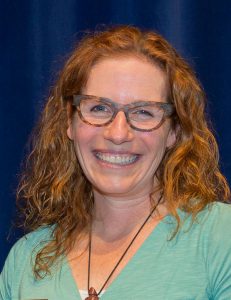Professor of English

Phone: 269.337.7045
Office: Humphrey House, room 207
Email: Amelia.Katanski@kzoo.edu
BA, Kalamazoo College
MA, University of California-Los Angeles
MA, PhD, Tufts University
Dr. Katanski is on sabbatical for the 2023-24 academic year
About Amelia
After receiving my BA in English from Kalamazoo College, I attended Tufts University in Medford, Massachusetts, where I earned my MA and PhD in English. I also have an MA in American Indian Studies from the University of California, Los Angeles. I have been back teaching at “K” since Winter, 2000 and my classes contribute to the English Department and the American Studies Concentration. My teaching interests include American Indian Literary and Cultural Studies and World Indigenous Literature, Multiethnic American Literature, Autobiography, and Literary and Cultural Theory, among many others. I love teaching my service-learning first-year seminar on “Commitments,” which focuses on commitment to place and works on projects related to supporting local food systems. I am the faculty advisor of Farms to K, a campus organization dedicated to bringing more locally grown food into the College cafeteria and building relationships between the College and the people who grow and produce the food we eat. Aside from my work on campus, I enjoy competing in triathlons, riding my bike, and hiking and camping with my husband Jon and our two Bedlington terriers, Neputo and Zuzu.
In the Fall of 2005, my book Learning to Write “Indian”: The Boarding School Experience and American Indian Literature was published by the University of Oklahoma Press and was reprinted in paperback in Fall 2006. My book examines the impact of federal Indian boarding school education on the American Indian literary tradition from 1879-present. My current research investigates the complicated relationship between the creative/literary productions of American Indian nations and both United States and tribal law.
My research on turn-of-the-century federal Indian boarding schools (designed as assimilatory institutions intended to eradicate tribal cultures and “Kill the Indian to Save the Man,” in the words of educator Richard Henry Pratt) has shown me how completely every educational experience is an education in culture. This insight underlies how I think about teaching and how I construct my classes. As Paulo Friere writes, “pedagogy as cultural endeavor is oppressive when it follows the banking model, in which a teacher sees herself as depositing the “right” information into the students, where it should sit unchanged until withdrawn to be used; but at its best, when it moves away from this banking model and allows for the critical thinking and engagement of students, pedagogical strategy can be liberatory, teaching students to read and respond critically to the world as text.” When I teach my students to be perceptive readers, critical thinkers, and persuasive and eloquent writers, I am teaching them how to engage in the discipline of literary scholarship, the focus of my personal and professional passion. But if their “reading” stopped with the texts I assign on my syllabi, I would be deeply disappointed. Culture has been described as the “lens” through which individuals or groups view the world, and I want my students to become aware of the presence of their lenses and therefore to evaluate critically the very process of reading. I construct my classes to provide the space and opportunity for my students not only to become excellent literary scholars, but also to be sensitive and discerning readers of their cultures, cognizant and respectful of the many different readings of the world that other cultures provide.
Courses Taught:
- ENGL 109: Introduction to Literary Theory and Research Methods
- ENGL 151: RTW: Environments: Gardens
- ENGL 217: World Indigenious Literatures: The People and the Land
- ENGL 222: American Indian Literatures
- ENGL 275: American Realism: U.S. Literature 1865-1914
- ENGL/SEMN 435: Advanced Literary Theories: American Indian Literature and the Law
- SEMN 135: FYS: Cultivating Community

